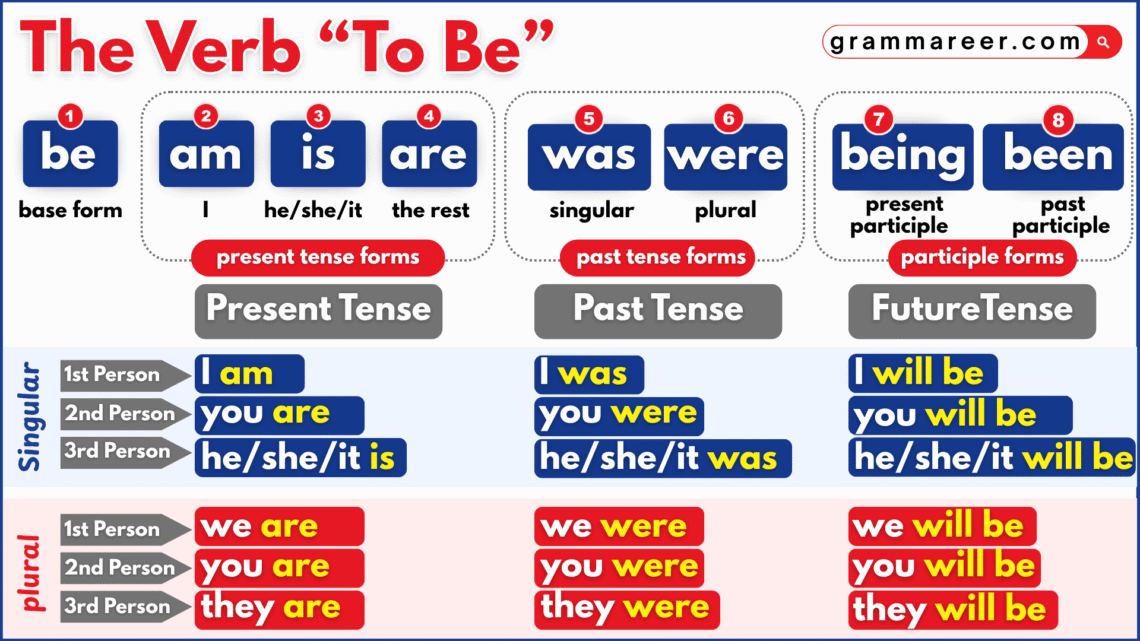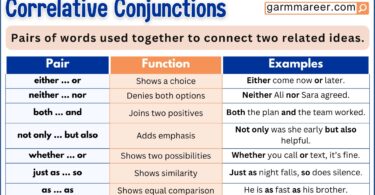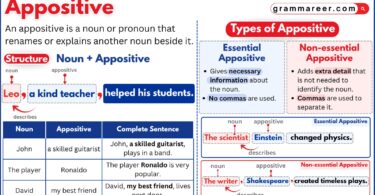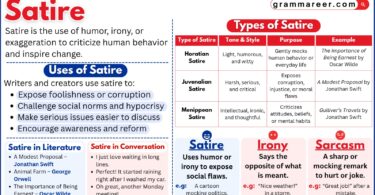The verb to be is one of the first and most important verbs you learn in English Grammar. We use it every day when we say things like I am happy, She is a teacher, or They were late.
In this article, you will learn what to be means and how it changes into different forms like am, is, are, was, and were. Additionally, you will see when to use each form in real sentences. Finally, do not worry if it feels confusing at first; with a little practice, it becomes much easier.
Table of Contents
What are the to be verbs?
The verb to be is one of the most useful and flexible verbs in English. It can act as a main verb or a helping verb, depending on how you use it.
“To be” as a main verb:
When to be functions as the main verb, it indicates existence or a state. For example, in the sentence She is a teacher, the verb tells us who she is. Therefore, use to be when you want to describe what someone or something is like or whether something exists. In other words, to be links the subject to a description or condition.
For example:
- I am tired.
- The bag is on the table.
- They were in the park.
“To be” as an auxiliary verb:
When to be works as a helping verb, it supports another verb to show tense or action.
For example:
- She is reading a book.
- We were playing football.
Here’s a quick list of the to be verbs and their functions:
| Form of “To Be” | Tense / Function | Example Sentence |
|---|---|---|
| am, is, are | Present tense | • I am happy. • She is a teacher. • They are friends. |
| was, were | Past tense | • I was late. • You were at the party. |
| be | Bare infinitive | • You should be polite. |
| being | Present participle | • He is being kind today. |
| been | Past participle | • She has been sick all week. |
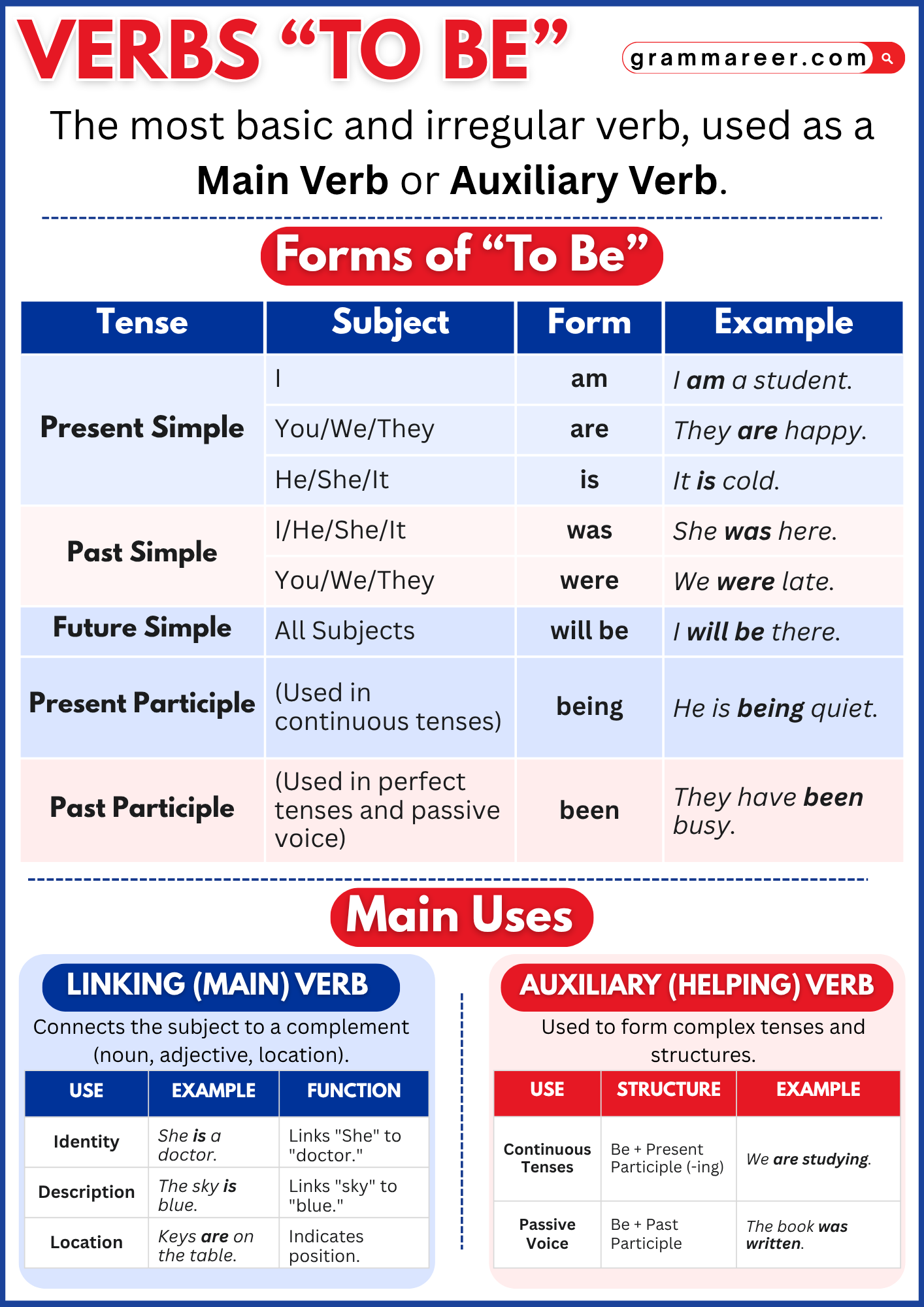
Forms of To Be Verbs
The verb to be is one of the most common and useful verbs in English. It helps us describe people, places, feelings, and situations. Depending on the tense and the subject, it changes its form. Let’s go through each tense step by step to understand how and when to use it.
Simple Present and Simple Past
The to be verb is often used in the simple present and simple past tenses. Each form changes according to whether the subject is singular or plural.
| Person | Singular | Example | Plural | Example |
|---|---|---|---|---|
| First person | I am | • I am a student. | We are | • We are classmates. |
| Second person | You are | • You are kind. | You are | • You are ready for the test. |
| Third person | He / She / It is | • She is my friend. | They are | • They are happy today. |
| Person | Singular | Example | Plural | Example |
|---|---|---|---|---|
| First person | I was | • I was tired last night. | We were | • We were late for class. |
| Second person | You were | • You were at the party. | You were | • You were busy yesterday. |
| Third person | He / She / It was | • He was in the park. | They were | • They were in the library. |
We also use to be as a helping verb to make continuous tenses. In these tenses, the main verb always ends in -ing.
Examples:
- Present Continuous: We are learning English.
- Past Continuous: They were watching TV.
Simple Future and Modal Verbs
In the future tense, to be does not change with the subject. We simply use will be for everyone.
| Person | Form | Example |
|---|---|---|
| All persons | will be | • I will be at school tomorrow. • They will be happy to see you. |
We also use be with modal verbs such as can, may, must, might, and should.
| Modal | Example |
|---|---|
| can | • You can be anything you want. |
| must | • He must be tired after work. |
| might | • It might be cold outside. |
| should | • They should be here soon. |
Present Participle
Sometimes to be is used twice in the same sentence. The first one works as a helping verb, and the second one is the main verb in its -ing form (being).
| Tense | Example | Meaning |
|---|---|---|
| Present Continuous | • I am being polite. | Shows current behavior. |
| Past Continuous | • She was being honest. | Describes behavior in the past. |
We usually avoid saying will be being because it sounds unnatural. Instead, we simply use will be.
Example: I will be careful next time.
Past Participle
The past participle of to be is been. It is used with have, has, or had in perfect tenses.
| Tense | Helping Verb | Example |
|---|---|---|
| Present Perfect | have / has | • I have been busy all morning. |
| Past Perfect | had | • She had been tired before the trip. |
| Future Perfect | will have | • They will have been here for two hours. |
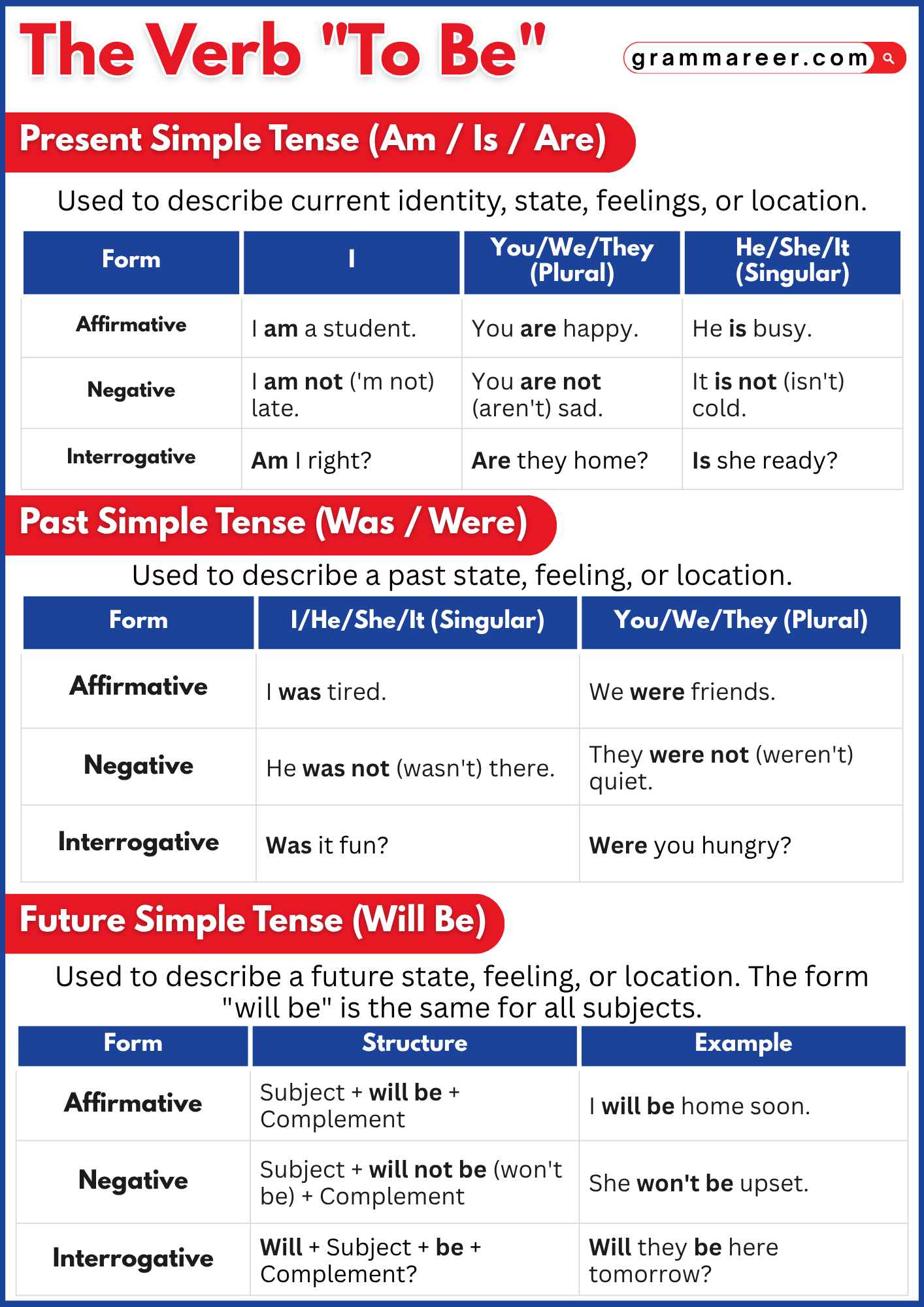
To Be Grammar Rules
The verb to be is one of the most important and commonly used verbs in English. However, it doesn’t always follow the same grammar rules as other verbs. It changes its form depending on the subject, the tense, and the type of sentence you’re making. Let’s explore the main grammar rules for using to be correctly.
Subject–Verb Agreement
Every verb in English must agree with its subject in number (singular or plural) and person (first, second, or third). This rule is called subject–verb agreement.
The to be verb changes more than most verbs, so it’s important to match it properly with the subject.
| Subject | Present Tense | Example | Past Tense | Example |
|---|---|---|---|---|
| I | am | • I am a student. | was | • I was late for class. |
| You | are | • You are friendly. | were | • You were at the party. |
| He / She / It | is | • She is my friend. | was | • He was very tired. |
| We | are | • We are ready to go. | were | • We were in the park. |
| They | are | • They are happy today. | were | • They were on vacation. |
Notice that to be verbs also follow special rules after there. When we use there is or there are, the verb agrees with the noun that comes after it, not with there itself.
Examples:
- There is a cat on the table.
- There are many students in the class.
If the noun is singular then use is. If it’s plural then use are.
Negative Forms of “To Be”
Making negative sentences with to be is very simple. Just add the word not right after the verb. In the future tense, it goes between will and be.
For Example:
| Tense | Examples | Explanation |
|---|---|---|
| Present Simple | • I am not tired. • You are not ready. • He is not busy. • We are not late. • They are not friends. | Add “not” right after am, is, or are. |
| Past Simple | • I was not at school. • You were not late. • She was not happy. • We were not there. • They were not hungry. | Add “not” after was or were. |
| Future Simple | • I will not be at home. • You will not be angry. • He will not be late. • We will not be free. • They will not be here. | Put “not” between will and be. |
Continuous and Perfect Tenses:
When using continuous or perfect forms, the word not goes between the helping verb and being or been.
| Tense | Examples | Explanation |
|---|---|---|
| Present Continuous | • I am not being rude. • You are not being fair. • He is not being serious. • We are not being helpful. • They are not being honest. | Put “not” between am/is/are and being. |
| Past Continuous | • I was not being careful. • You were not being kind. • She was not being patient. • We were not being noisy. • They were not being nice. | Same pattern: after was/were, before being. |
| Present Perfect | • I have not been well lately. • You have not been honest. • He has not been home. • We have not been ready. • They have not been busy. | “Not” goes between have/has and been. |
| Past Perfect | • I had not been there before. • You had not been happy. • She had not been polite. • We had not been to Spain. • They had not been friends. | Place “not” between had and been. |
Using Contractions:
In everyday speech, we usually shorten these negatives using contractions like isn’t, aren’t, wasn’t, and weren’t.
They sound more natural and are very common in spoken English.
| Full Form | Contraction | Example |
|---|---|---|
| is not | isn’t | • She isn’t home. |
| are not | aren’t | • They aren’t ready. |
| was not | wasn’t | • He wasn’t here. |
| were not | weren’t | • We weren’t at school. |
| am not | I’m not | • I’m not sure about that. |
Question Forms of “To Be”
The to be verb has its own rule for making questions. Unlike other verbs, it does not need do or does to form questions. Instead, you just move the verb to be before the subject. For the future tense, you just put the subject between will and be.
Examples:
| Tense | Examples | Explanation |
|---|---|---|
| Present Simple | • Am I late again? • Are you ready for school? • Is he your teacher? • Are we on time? • Are they your friends? | Just move the “to be” verb (am, is, are) before the subject. |
| Past Simple | • Was I wrong? • Were you at the party? • Was she upset? • Were we in the same group? • Were they at the meeting? | Same idea — move “was” or “were” before the subject to ask a question. |
| Future Simple | • Will I be there tomorrow? • Will you be busy later? • Will he be ready by noon? • Will we be home soon? • Will they be tired after work? | Place “will” first, then the subject, and “be” after it. |
Now, if you’re using continuous or perfect tenses, the pattern remains almost the same. However, you need to make sure that being or been comes right after the correct form of to be or have. Additionally, this rule helps your sentence stay grammatically correct and easy to understand. Therefore, always place being or been immediately after the helping verb.
| Tense | Examples | Explanation |
|---|---|---|
| Present Continuous | • Am I being rude? • Are you being honest? • Is she being polite? • Are we being fair? • Are they being serious? | Use “am,” “is,” or “are” before the subject, then add “being.” |
| Past Continuous | • Was I being too loud? • Were you being lazy? • Was he being careful? • Were we being helpful? • Were they being silly? | The same switch — just keep “being” after “was” or “were.” |
| Present Perfect | • Have I been clear? • Have you been there before? • Has he been okay? • Have we been helpful? • Have they been to London? | Use “have” or “has” before the subject, followed by “been.” |
| Past Perfect | • Had I been there earlier? • Had you been tired before the trip? • Had she been kind before? • Had we been at the meeting? • Had they been there long? | Start with “had,” then the subject, and add “been.” |
Common Expressions with “To Be”
By now, you already know how important the verb to be is in English. But did you know it also appears in many everyday expressions? Let’s explore some of the most useful ones you’ll often hear in conversations.
| Expression with “To Be” | Meaning/Use | Example Sentence |
|---|---|---|
| To be about to | Used when something is going to happen very soon. | • I’m about to call her, just give me a second. |
| To be able to | Means “can” or having the ability to do something. | • She was able to solve the puzzle easily. |
| To be supposed to | Used when someone is expected or required to do something. | • You’re supposed to finish your homework before dinner. |
| To be likely to | Shows that something is probable or expected to happen. | • It’s likely to rain later tonight. |
| To be meant to | Suggests that something is intended or has a purpose. | • This movie is meant to inspire young artists. |
| To be due to | Used for something that is scheduled or planned to happen. | • The train is due to arrive at 9 o’clock. |
| To be for / against | “For” shows support; “against” shows opposition. | • I’m for equality, but against unfair treatment. |
| To be right / wrong | “Right” means correct; “wrong” means incorrect. | • You were right about the shortcut! |
| To be late for | Means not arriving on time. | • He was late for his meeting again. |
| To be sorry | Used to express regret or apology. | • I’m really sorry for being late. |
| To be mistaken | Means to be wrong or incorrect about something. | • I thought the shop was open, but I was mistaken. |
These expressions are super common in spoken English. The best way to remember them is by using them in your daily conversations or listening to how native speakers use them in movies, podcasts, or short clips online. The more you hear them, the more naturally they’ll become part of your own speech!
To Be Verbs FAQs
The verb to be is used when we talk about existence or identity — like saying something is, was, or will be. It’s one of the most basic and important verbs in English because we use it all the time to describe people, things, and situations.
These verbs change depending on the subject. For example, we say I am, you are, he is, they are. In the past, they become was and were. So, the verb has to “agree” with the subject — that’s what we call subject-verb agreement.
We mostly use to be verbs in the present and past, but they can also help form other tenses.
For example, in I am studying or they were working, the verb to be helps show the continuous action.
You May Also Like

